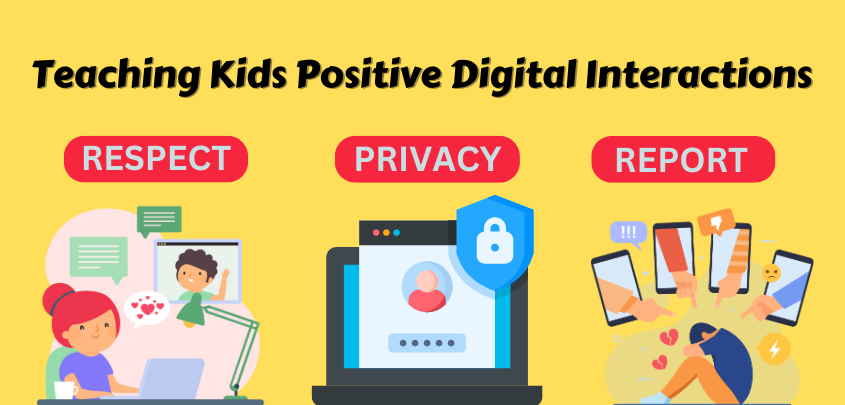
09, Jul, 2024
Teaching Kids Positive Digital Interactions: Privacy, Respect, and Reporting Online
In today’s interconnected world, social media provides children and teens with unprecedented opportunity to connect, create, and learn. But benefits come with risks as well as duties, particularly when it comes to respect, privacy, and reporting issues like cyberbullying.
The Importance of Privacy and Safety
The importance of privacy is among the most important things that kids using social media should learn. A lot of children unintentionally give away personal information about themselves, such as their location, school name, or contact information, which leaves them open to identity theft and online predators. Protecting children’s digital footprint requires teaching them how to utilize privacy settings wisely and to exercise caution when sharing anything online.
Respectful Online Behavior
Respectful conversation online is another essential component of healthy digital relationships. Fostering a helpful online community can be achieved by encouraging youngsters to treat others with kindness and empathy in both their posts and interactions. It might be helpful to emphasize the value of acting respectfully online by talking about the possible repercussions of sharing offensive or hurtful content.
The Role of Reporting and Cyberbullying
Cyberbullying continues to be a problem that affects children’s mental health and general wellbeing. It is imperative that parents equip their children with the necessary skills to identify cyberbullying and respond accordingly. Promote open dialogue to help kids feel at ease talking about any harassment or bullying they may have experienced. Parents can also play a proactive role by reporting cyberbullying incidents on platforms like the national cybercrime portal and supporting their child in blocking the perpetrator on respective apps.
Practical Steps for Parents
Parents can guarantee their child’s online safety and encourage pleasant digital connections by implementing the following simple steps:
- Encourage Open Communication: Establish a safe space where kids can talk about their worries and experiences with the internet. Stress how crucial it is to report any questionable or dangerous activity.
- Setting Boundaries: Define clearly what information should be shared online and the most effective to utilize privacy settings. As your child grows older, check these rules frequently and make adjustments.
- Educate Children About Privacy: Instruct kids on how to safeguard their privacy and the dangers of disclosing personal information online. Talk about the possible consequences of sharing images, places, or private information.
- Empower Reporting: Teach kids how to report inappropriate activity on social media sites like cyberbullying. Read about the reporting processes and tools so that you can assist your kid in the event that they need it.
- Model Positive Behavior: Lead by example by demonstrating respectful and responsible online behavior. Teach your child how to settle disputes respectfully and to participate in positive online dialogues.
Creating a Supportive Digital Environment
Parental guidance can enable their children to navigate the digital realm with confidence and responsibility by emphasizing privacy, respect, and proactive reporting. Developing empathy, encouraging open communication, and establishing clear standards are essential elements in enabling kids to use social media responsibly and stay safe while doing so.
By working together, we can make sure that the next generation has the information and abilities necessary to prosper in an increasingly digital world and that their online interactions are safe, courteous, and educational. We can make the internet a safer and more encouraging place for kids by collaborating with schools, communities, and online platforms.
